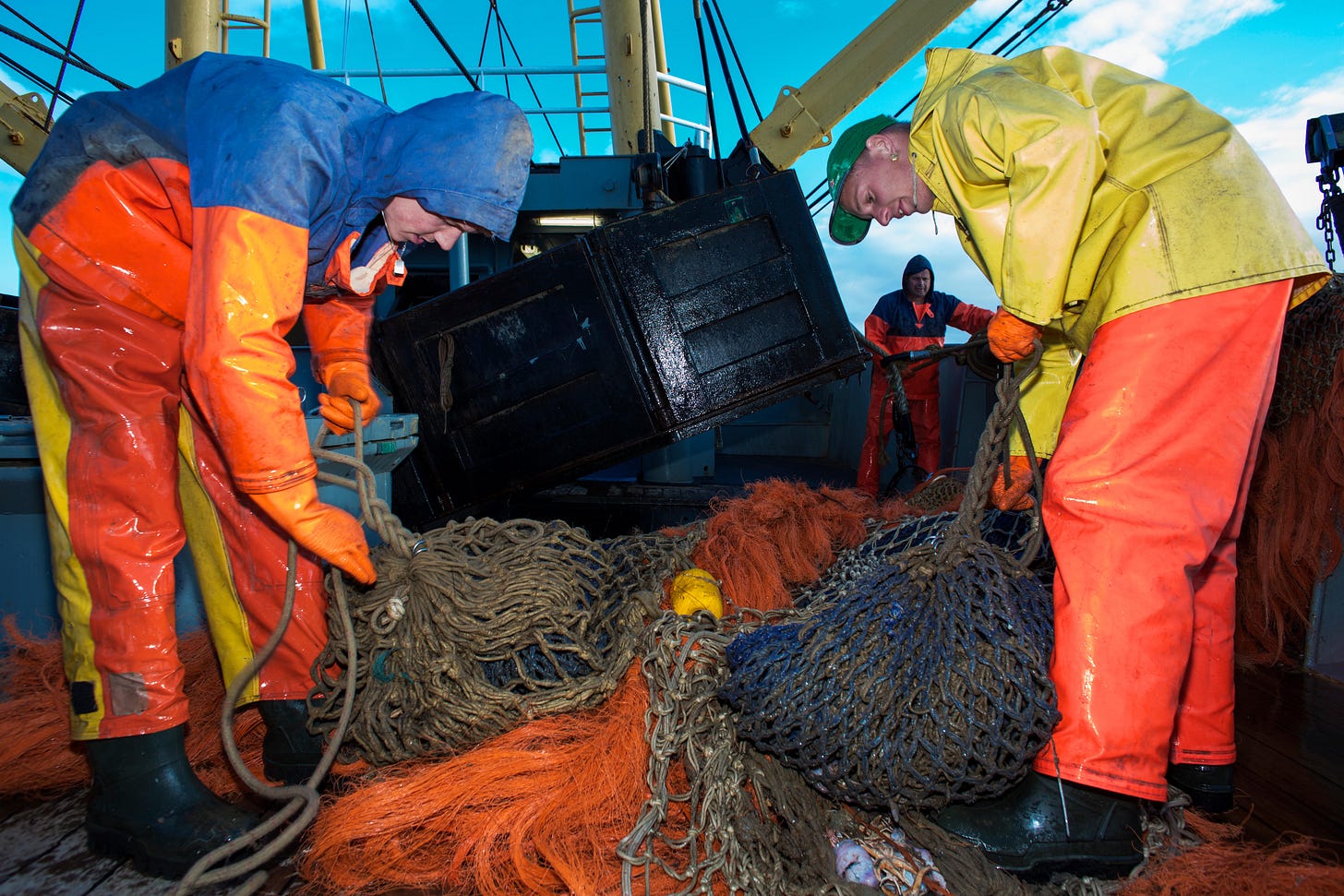Fishermen’s voices must be heard amid Attenborough ocean propaganda
Fishing deserves a better press. Those who make their livelihoods from the sea have the most to gain from marine protection.
He is our national treasure, embraced by kings, princes, prime ministers and celebrities too many to mention. This week, it is his campaign to save the ocean that is driving the UN Ocean Conference as it tries to ratify the High Seas Treaty.
Who would dare to denounce David Attenborough, beloved around the world for his conservation crusade, feted in the highest echelons and trusted to such an extent that his every word is gospel?
Step forward one Elspeth Macdonald, little known outside her Scottish homeland but a strident, often lone, voice of dissent in the Attenborough global love-in.
Macdonald is the chief executive of the Scottish Fishermen’s Federation (SFF) but she speaks for the industry across Britain when she calls out the “anti-fishing propaganda” of Attenborough’s recently released film, Ocean.
In a statement this week, the SFF said the film had spearheaded a “fresh onslaught” from environmental non-governmental organisations “designed to influence delegates” to the UN conference in Nice, which ends today.
“Deploying the full panoply of Hollywood tear-jerk techniques”, Ocean “wholly blames the industry for the poor state of the planet’s oceans” and “singles out fishing from every other form of human impact on our seas”, said the SFF.
Fishing communities believe that the proposal by the UK government to ban bottom trawling in 41 out of 181 marine protected areas (MPAs), causing huge hardship to fishermen, is a direct consequence of Attenborough’s influence.
Macdonald said: “It is extremely disappointing the UK government seems to have caved to the emotional, unevidenced siren calls of the environmental NGOs and Sir David Attenborough, and announced a ban on trawling in English MPAs.
“Banning fishing in such an arbitrary and ignorant fashion will deprive hard-working people of their jobs and cost very often marginal communities much-needed income.”
The National Federation of Fishermen’s Organisations (NFFO), which represents the industry in England, said Attenborough’s film, as far as it relates to the UK, “makes claims about the impact of bottom trawling that are not recognisable in Britain’s modern fishing fleet”.
“New technology and more scientific, evidence-led fisheries management has led to a present-day fleet that is increasingly selective in its gear and restricted in its activities to those areas that can sustain it,” said the NFFO.
Until the release of Ocean, the NFFO had been in discussion with ministers about a more targeted approach to conservation, including management measures for MPAs that would focus on restricting fishing only in particular grounds, rather than a blanket ban.
But the Attenborough juggernaut has swept away all science-based decisions, as environmental lobbying tends to do.
The veteran BBC man not only secured the patronage of King Charles, who attended the premier of Ocean, and captured Prince William, who has gone on to make some far-fetched claims about fishing, but he also roped in Stephen Fry, who has made a video nasty about by-catches.
Most of the above will have little understanding of what is meant by bottom trawling, which accounts for about 30 per cent of wild caught seafood internationally.
It is, of course, much easier to find headlines decrying the perceived evils of fishing than those extolling its virtues, but there is valid research providing a contrary view.
For instance, in a review paper published in the ICES Journal of Marine Science in 2023, researchers argued that well-managed bottom trawling produces sustainable and environmentally friendly food, with less environmental impact than, say, chicken or pork production.
Crucially, a global assessment found that 66 per cent of the seabed area was not trawled at all, and 93 per cent was at least 80 per cent intact. In terrestrial food production, roughly zero per cent of land is intact after being cleared for crops or livestock production.
These inconvenient truths did not make it into the Attenborough film, which also fails to mention aggregate dredging, subsea cables, seabed mining, or, as the NFFO said, “the tens of thousands of square kilometres of seabed that our government plans to lease to multinational energy giants, to build their wind power stations on”.
How can a relatively small sector make its case when the moral high ground has been so comprehensively conquered by far louder and more powerful voices?
Fishing leaders have invited people to come to fishing ports and see for themselves, to talk to gear technologists helping to minimise ground contact and reduce bycatch even further, and to engineers exploring zero-carbon alternatives to fossil fuels for fishing boats.
This battle has already been waged to some extent north of the border. An ill-judged initiative to introduce highly protected marine areas (HPMAs) across ten per cent of Scottish seas two years ago, driven by the Scottish Greens, was dropped after a backlash that united fishermen, fish farmers and coastal communities in Scotland.
Responding to the current UK plans, Macdonald said: “We are sure the Scottish government will take a much more intelligent, grown-up and responsible approach to the rules and regulations around fishing in Scotland’s MPAs”.
Let’s hope she is right; the debate in Scotland was notoriously bitter and ill-informed, and there is still bad blood following the industry’s reprieve.
But fishing deserves a better press. Those who have the most to gain from marine protection are the people who make their livelihoods from the sea.
It is them we should listen to, not the cacophony of cherry-picked outrage, if the oceans are to be exploited productively and sustainably, as they must be, to feed the world.




